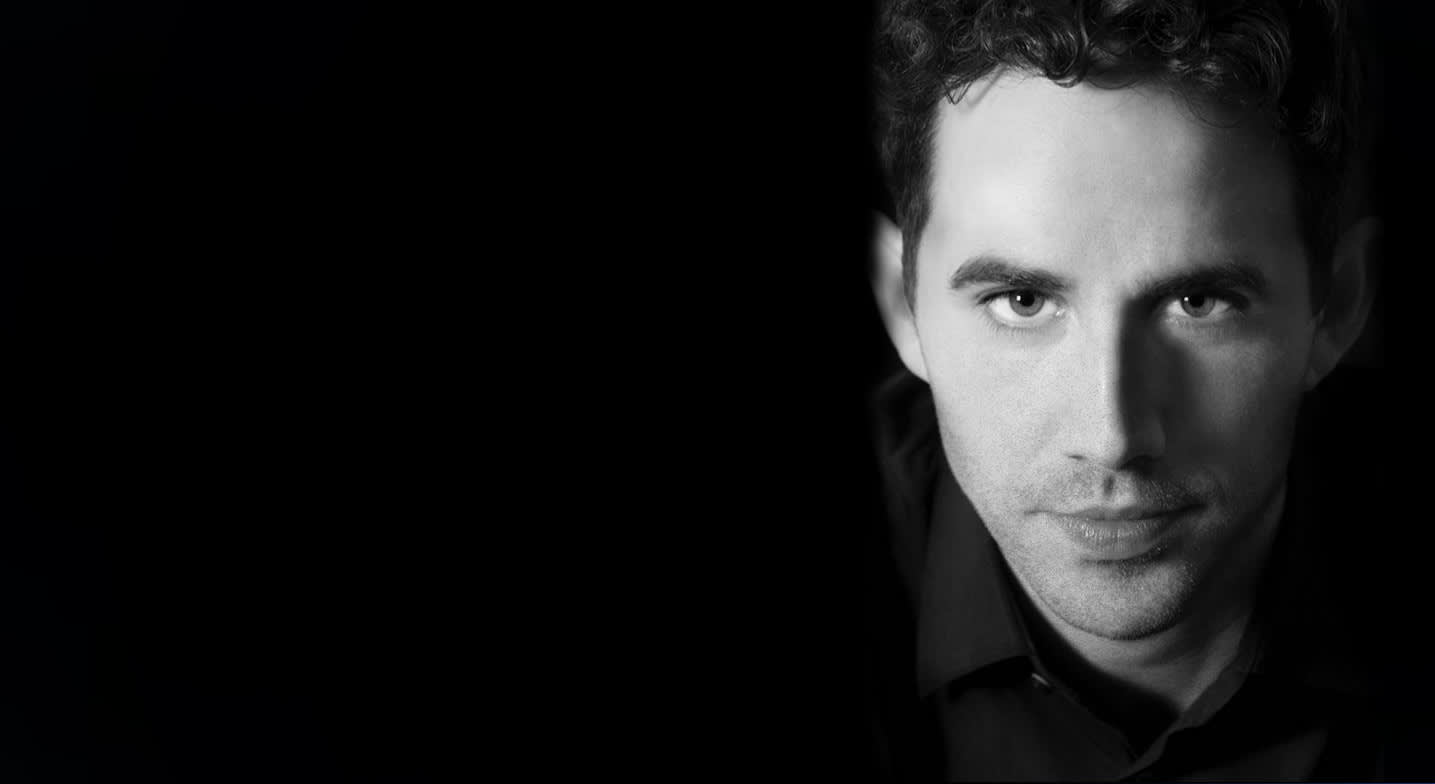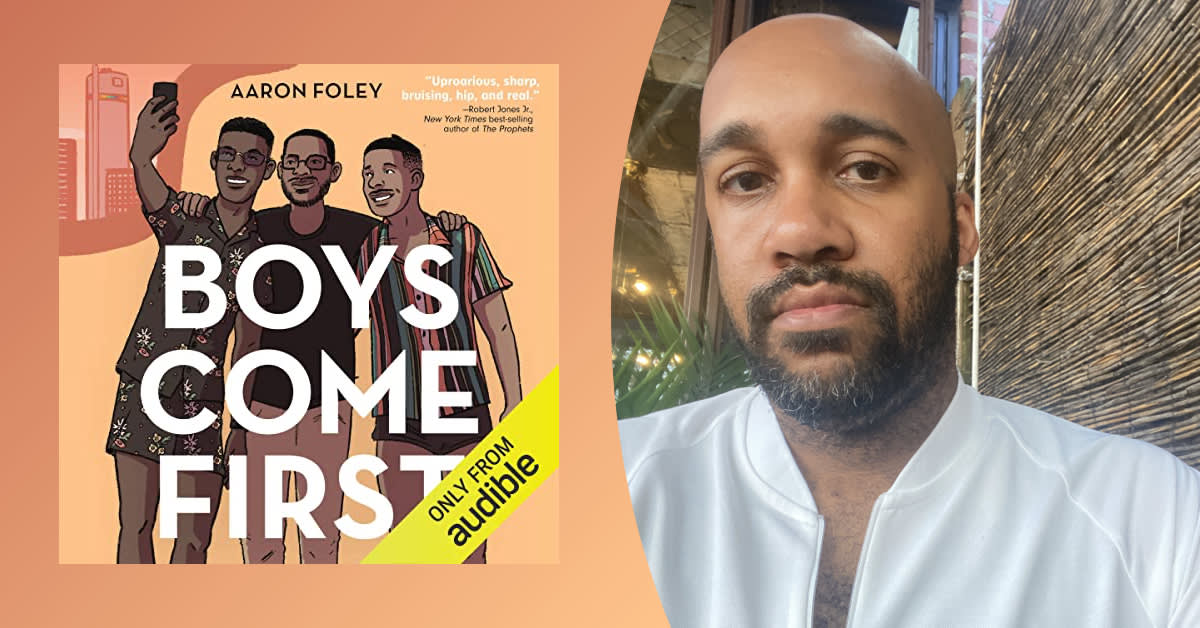You may know actor Santino Fontana from his performances in My Crazy Ex-Girlfriend, or as the voice of Hans in the blockbuster Frozen, or from his many starring roles on Broadway, but he has also become the indelible voice of many a beloved character here at Audible. Editor Katie had the chance to talk to the Audie and Tony nominee about the highlights in his career, and how he taps into the dark side of any character.
Katie O'Connor: Hi, Audible listeners. It's your Audible editor, Katie, here, and today I am so excited to be talking to Santino Fontana. Hi, Santino.
Santino Fontana: Hello.
KO: You, by Caroline Kepnes, really took over this office a few years back. Your performance of stalker/murderer, Joe, completely mesmerized us, and we're hooked on this series. How do you get into the mindset of Joe?
SF: Thank you. I think, really, it's all in the book. I think all of that is owed to Caroline. All I have to do is follow the tracks that she set up. They're fascinating, but I didn't feel like I really had to do anything in particular, other than just tell the story that she wrote.
KO: Yeah, the combination of Caroline's writing and your performance, it just really made us root for him. That's hard to do with a character that has so many shortcomings and felonies to his name. What do you think it is about Joe that oddly endears him to people?
SF: I think everybody has a feeling of wanting to fight back at injustice with things that they view as not fair. From Joe's point of view, I think we root for [him] because we're only seeing his point of view. We're seeing all the people that we all have had problems with, or feel like, "Oh, god, I can't stand that kind of person. I hate when people do that and they just get away with it." Or, "Why can people behave that way and no one punishes them?" Or, "No one tells them they can't do that."
KO: Yeah, the secret dark side in all of us.
SF: Yeah, you have a sociopath who doesn't feel like there's a limit to what he can do to enact revenge or just ... whatever he wants. It's a screwed-up fantasy that we all kind of want.
KO: Oddly freeing. In a similar fashion to Carolyn Kepnes' book, A Man Called Ove, by Fredrik Backman, really also took over our office. You're narrating a novella for Backman called A Deal of a Lifetime. What appeals to you about Backman's writing style?
SF: Oh, boy. I know it's lame for me to say, but I love being able to read different writers, and just jump into their world and hopefully carry the baton for them into the listener's ear. Just kind of be able to pass it on. I would say that about every writer that I've worked on. I think every book that I have read, I have been kind of fascinated by, and learned so much from. I have never left the recording booth and not called friends of mine and been like, "Hey, I just read this thing, you have to check this out."
KO: That's amazing.
SF: I have done that to every book that I've read. And they've been pretty varied, so I would say the same with Backman, yeah.
KO: The protagonist in A Deal of a Lifetime is another sympathetic but also ruthless character telling his side of the story. How did you relate to this voice?
SF: Oh, boy. I don't remember, to be honest with you.
KO: That's okay.
SF: I remember the broad strokes of each of the books, but because it's such an intense experience for such a brief period of time, I know that's lame to say, but I don't actually remember the super specifics. I remember the broader ...
KO: The broader feeling?
SF:: Oh, gosh. Yeah, I wish I had it in front of me now. I just remember it feeling much more the same.
KO: So, in that vein, I have to ask. We have an obsession in our office over books that make you ugly cry, and this one has officially joined the list. Do you recall-
SF: Oh, really?
KO: Yeah. Was there any ugly crying on your part when you got to the end?
SF: Listen, I think it's so ... I agree. Here is what I would say about the ruthless side. I'd say that Backman is so ... what's the word? Mystical or ... how do you describe? I don't know how to describe it. All I know is, the Backman piece was so unique, artistically unique, and I had no idea where it was going. I wouldn't say I ugly cried, but I wouldn't say that I didn't ... I thought it was incredibly moving, and a great way to remember to be grateful for what we have. Life is complicated and vulnerable, and I thought he captured the complexities of all of those sides really well. Does that make sense?
KO: Absolutely, yeah.
SF: I don't know if that made sense.
KO: It was a moving piece.
SF: Yeah, sad.
KO: I had the pleasure of meeting you in person in New York one night after your performance as John Adams in the musical 1776. How do you balance your different performance media? Broadway, TV, singing, narration, voice work?
SF: Well, they're all so different, but they all start from the same kernel of storytelling, and trying to tell someone else's story, and to engage an audience while you're doing it.
Listen, I think variety is the spice of life, and I love that. So I love being able to do a variety of things, and a variety of mediums. Being able to do stuff on stage is unique only because it's the only place where you have no protection from an editor. So, it's exciting because you have to call on all of your skills in order to hold everything together, and the audience is right there watching it. In an audiobook, or an animated piece, or a television show, or a movie, you get multiple hacks at things. And people can splice it all together so that it's the way that we all want it.
On stage the stakes are higher because everybody's witnessing what you're doing in the moment, and you can't go back. You've got to keep moving forward, which is exciting.
KO: I can only imagine.
SF: But it's harder to transform ... not that it's harder. It's more complicated to transform on stage because, for example, doing an audiobook, I can get away with a lot because no one has to see what I look like. You know, I'm wearing pajamas and a baseball hat. I can pretend to physically be however I think I would be, and see what voice comes out, and hopefully fool people. But on stage it's more complicated. Same with on camera. But yeah, it's all different. I would say editing is the big difference between everything.
KO: That makes sense. What's your favorite book?
SF: My favorite book? You know, this is what's so lame. Sadly, the majority of books that I've read have been books that I have narrated. Aside from when I was younger. So, I used to be obsessed as a child with all the Roald Dahl books. I read all of them. I loved that stuff. I love it.
Then I got into this really weird kick where I was reading the Grimm's Fairy Tales, which I also find fascinating. Like all of the stories we don't really know. Then I remember reading, oh gosh ... Catch-22, and The Great Gatsby, and the same ones that everybody else loves. The Alchemist, ... yeah, those are great books.
KO: All the classics.
SF: Sorry, go ahead.
KO: I was just going to ask if there's any from among that list of childhood favorites, or recent reads, that you would love to perform? Be the narrator for?
SF: Oh, boy, I've never even thought of that. Oh, that's a good idea. I'm sure there are. Now I'm going to go back and brainstorm.
KO: I know our fans would love it if you came up with more things to narrate.
SF: I can't think of any off the top of my head. Let me keep thinking about that. That's exciting. I hadn't thought of that.
KO: Yeah, let us know. Do you listen to audiobooks?
SF: Occasionally, I have. I listened to, my wife and I were huge fans of Carrie Fisher, so when she passed away we listened to her book. I haven't listened to a lot of fiction. I've listened to mostly non-fiction, and maybe that's because I spend so much time in make believe world...
KO: That makes sense.
SF: Yeah. I listened to a Lance Armstrong audiobook, and then I listened to something related to that. I can't remember the name of it. And I listen to a lot of podcasts and stuff. Any time we go on a road trip, we do. But sadly, I don't have a car. Few and far between.
KO: City living.
SF: Yes, exactly.
KO: What got you into narration?
SF: You know, I had an audition. I was one of those actors who was working in theater in New York, and people continually came up to me and were like, "So, you do a lot of voiceover stuff, right?" And I was like, "No." Then a couple of months would go by and someone else would say, "So you do a lot of voiceovers?" "No, who do I call? How do I start doing that? I would love to do that."
Then a friend set me up with her voiceover agent, who I met with, and he was like, "You could do this." And I was like, "Yeah, everyone keeps telling me that. I have no idea how or where." And I got an audition. That was it. I recorded the audition for, I think it was Wheelmen, the Lance Armstrong book, and went in and did that. I was in the middle of a play.... I don't remember which show I was in. I was in a show on Broadway, and I was going it at the same time, which was exhausting.
KO: I'm sure.
SF: I remember thinking, "This is a lot to talk for eight hours, and then go and do a play for two-and-a-half or three." But, I thought it was super exciting, and it feels, in a lot of ways, kind of the purest form of acting because you're not limited by anything else, other than your imagination and listeners. So, that's exciting.
But that was it. Then I started doing more and more. Occasionally they'll come down the pike, and I'm excited when I get to do them.
KO: And we're excited to listen to them.
SF: Thank you.
KO: It was lovely speaking with you today.
SF: Likewise! Thank you so much for having me.







